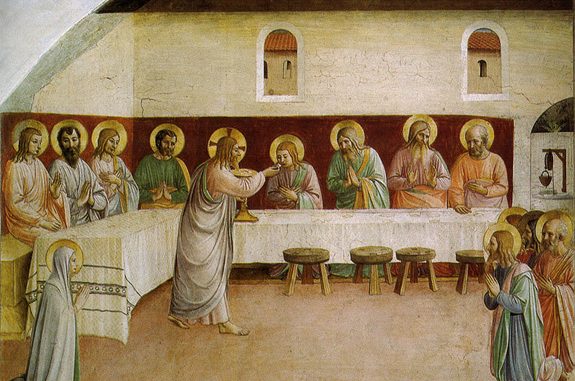

Readings:
• Gen 14:18-20
• Ps 110:1, 2, 3, 4
• 1 Cor 11:23-26
• Lk 9:11b-17
Shortly after my wife and I entered the Catholic Church in 1997, I had a conversation with an Evangelical friend that was as disconcerting as it was friendly. A.J., who I met in Bible college several years earlier, was curious about the Catholic doctrine that the Eucharist is the true Body and Blood of Jesus Christ. I say “curious” because A.J., unlike some of my other Protestant friends, was not really bothered or offended by this belief, merely puzzled. After much discussion, he said, “I don’t see what the big deal is. I believe that Communion is symbolic, and you believe it is more than a symbol. But, either way, we’re both Christians.”
His comment surprised me because it was readily evident to me—as it is to many Protestants—that the Catholic belief in the Eucharist (shared by Eastern Orthodox and Ancient Oriental Christians) is an “all or nothing” proposition. If the Eucharist is Jesus, it calls for a response of humble acceptance; if the Eucharist is not really Jesus, it is an idolatrous offense against God—worshipping bread and wine as though they are somehow divine.
On this feast day celebrating the Most Holy Body and Blood of Christ, the readings reveal, in different ways, the truthfulness of the ancient and consistent belief in the Eucharist. It is fitting that this great mystery has ancient roots in one of most mysterious of all biblical figures: the priest Melchizedek, who makes just one historical appearance in the Scriptures (Gen. 14:18-20), is mentioned once more in the Old Testament (Ps. 110:4), and then reappears in the seventh chapter of the Epistle to the Hebrews.
Having just left the battlefield, Abram encountered the “king of Salem”, who was also a “priest of God Most High.” Melchizedek brought bread and wine to Abram and blessed the patriarch, and Abram responded with a tithe. Both actions indicated Melchizedek’s superior position, as noted in the letter to the Hebrews (Heb 7:1-7). It is the first time a priest is mentioned in the Scriptures, several centuries before the Hebrews had a priesthood.
“The Christian tradition,” the Catechism states, “considers Melchizedek, ‘priest of God Most High,’ as a prefiguration of the priesthood of Christ, the unique ‘high priest after the order of Melchizedek’” (CCC 1544, 1333). Christ’s priesthood is superior to the Aaronic priesthood. Because He is the Son of God and is God Himself (the argument of Hebrews 1), His priesthood is validated by His eternal nature and His infinite being (Heb. 7:16, 24ff). Melchizedek’s importance lies in his loyalty to God Most High, the purity of his intentions, and his sacrifice of bread and wine. He represents a time when the priesthood was part of the natural order of family structure. By establishing the New and universal covenant through His death and resurrection, Jesus Christ formed a new and everlasting family of God, bound not by ethnicity, but by grace and the Holy Spirit.
And because Jesus is God, He is able to give the household of God His Body and Blood for the nourishment of soul and body, and for the forgiveness of sins. By providing this Eucharistic banquet, a foretaste of the Kingdom of God, He fulfills the promise of a worldwide family of God foreshadowed in the person of the king-priest Melchizedek. The feeding of the five thousand, described in today’s reading from Luke’s Gospel, anticipates and represents the sacrament of the Eucharist, as Christ miraculously feeds—with the assisting hands and efforts of His priests, the Apostles—those who hunger to hear His words.
If the bread and wine remained unchanged, Christ would be, at best, equal to Melchizedek. But the King of Kings said, “This is my body that is for you”, and the High Priest declared, “This cup is the new covenant in my blood.” The Eucharist is Jesus Christ. That is the great truth we humbly celebrate today—and every day we receive the Most Holy Body and Blood of Christ.
(This “Opening the Word” column originally appeared in the June 10, 2007, edition of Our Sunday Visitor newspaper.)
If you value the news and views Catholic World Report provides, please consider donating to support our efforts. Your contribution will help us continue to make CWR available to all readers worldwide for free, without a subscription. Thank you for your generosity!
Click here for more information on donating to CWR. Click here to sign up for our newsletter.


